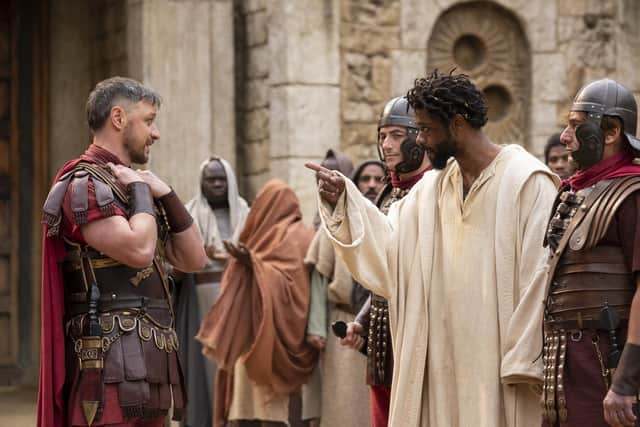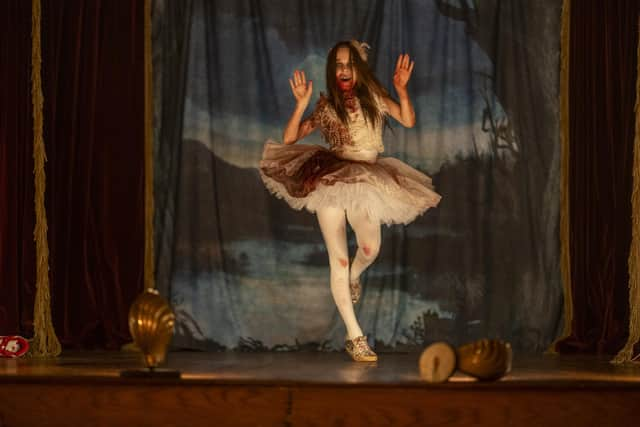Film reviews: The Book of Clarence | Abigail | Sometimes I Think About Dying
The Book of Clarence (15) **
Abigail (18) **
Sometimes I Think About Dying (12A) ***


Judas and the Black Messiah Oscar-nominee LaKeith Stanfield takes the lead in a more biblical riff on the crucifixion story in The Book of Clarence, a wildly incomprehensible “comedy” about religious devotion in which every gag, every concept, every stylistic tic comes wrapped in quotation marks. There’s the sub-Tarantino, myth-interrogating counter-narrative; the sub-Monty Python pokes at piety; the sub-blaxploitation score; the sub-Baz Luhrman visual overload; the sub-Ben Hur-style pompousness; the sub-Andrew Lloyd Webber musical interludes; even a kind of sub-Scorsese reverence for the complexities of faith – none of it coming together in any way that might suggest the film’s British writer/director/composer Jeymes Samuel (The Harder they Fall) has anything but the vaguest sense of what he’s trying to achieve.
That isn’t to say he doesn’t have some intriguing ideas. Working with a majority Black cast, there’s a prolonged build-up to a gag about western interpretations of Jesus that’s quite funny before it turns feeble (it relies too heavily on a cameo from an A-list star). And casting Stanfield as an atheistic, dope-slinging wannabe messiah trying to side-hustle his way out of a gambling debt raises the odd smile, especially when his character, Clarence, is taken to task by an outraged John the Baptist (David Oyelowo). But from the moment Samuel opens the film with a chariot race between Clarence and a badass Mary Magdalene, who looks like she’s missed a casting call for Mad Max Fury Road (she’s played by Teyana Taylor), its efforts to find a narrative path through all the insistent wackiness and tonal changes proves exhausting, with the latter resulting in a talented cast – which includes Marianne Jean-Baptiste, Omar Sy and a mascara-sporting James McAvoy as Pontius Pilate – acting as if they’re in wildly different movies.
Advertisement
Hide AdThat goes for Stanfield too. His laidback turn as Clarence is endearing at first, but as Clarence’s misdemeanours and fraternal conflicts with his Apostle brother Thomas set him on a path to true enlightenment (Thomas is also played by Stanfield, disguised here in a big comedy beard), his chilled irreverence becomes more and more absurd as the film takes a turn towards devoutness, one that starts out with some of the thoughtfulness of The Last Temptation of Christ, then jarringly gets properly bloody and violent, like something out of the The Passion of the Christ.
What’s frustrating too is just how heavy-handed much of the humour and the efforts to draw contemporary parallels are. Its homages to The Life of Brian, for instance, are shorn of any satirical edge or any real subversiveness; its visual gags are eye-rollingly lame; and its use of the Roman Empire as a symbol of systemic racism doesn’t get much deeper than giving Roman generals peroxide-blond hairdos – until, that is, it throws in an anguished Black Lives Matter lament as Clarence bears his cross en route to Golgotha. Of course there’s something to be said for Samuel taking such a big swing in an industry prone to playing things safe. But there’s taking a big swing and then there’s taking a big swing, missing completely, letting go of the bat and accidentally bludgeoning the audience. The Book of Clarence, sadly, does the latter.


On the subject of bludgeoning the audience, Abigail botches a promising horror premise with protracted build-up to a reveal that the film’s marketing campaign has already given away. Directed by Matt Bettinelli-Olpin and Tyler Gillett, who recently revived the Scream franchise, the film revolves around a group of anonymous-to-each other criminals brought together to kidnap the ballet-dancing pre-teen daughter (Alisha Weir) of a wealthy family. Led by Dan Stevens and nouveau Scream-star Melissa Barrera, this group of rag-tag desperados start freaking out when they discover that the titular abductee’s father is a notorious crime lord whose reach into every aspect of life has achieved mythic proportions – just like Keyser Söze from The Usual Suspects. Indeed, for much of the the first hour, the film persists in presenting this as a slasher movie-inflected riff on that film, even though we all know Abigail is really a vampire and the whole thing has been a set-up. Thenceforth the film descends into a tedious gore-fest as vampire lore is debated and this crew of unsympathetic reprobates try to figure out how to escape their trap-like location. Though Stevens has enough charisma to remain compelling throughout, what’s missing is any sense of threat, tension or chills. In their place? Buckets and buckets of blood. It’s not enough.
Star Wars alumnus Daisy Ridley goes down the US indie route with Sometimes I Think About Dying, a character study about loneliness enlivened by some interesting stylistic flourishes and a lush string score that recalls some of Gus Van Sant’s work. Ridley plays Fran, a socially inept office worker who mostly sits on the sidelines of life, unsure of how to properly participate. At work and at home she often catches herself daydreaming about her own death, not because she’s suicidal, more because she can’t fathom whether or not her existence has any bearing on the world around her. Director Rachel Lambert renders these fantasies in darkly beautiful tableaus that look like something Gregory Crewdson might photograph. They certainly help distinguish Ridley’s character from the typical sad-sacks who usually populate such movies – though Ridley herself is also quite good, particularly as Fran’s evolving relationship with new work colleague Robert (Dave Merheje) forces her to confront her own brittle nature.
All films are in cinemas from 19 April